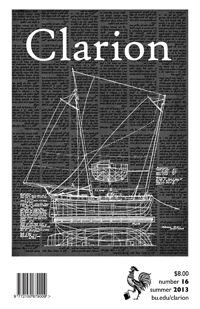|
Charles Byrne
An Argument From Theology
Were woman from man,
oughtn’t she be an an?
Instead, she conjoins
an o, a w,
and so is supervened
by him. In fact, to use
the language of God,
she is the breath in
his nostrils, though in truth
she breathes instead
into his navel,
hand on his breast, hand
on his rib, as she
shapes him from the mud
of her womb. In the end,
though, one wonders why
it should matter who
came from whom, since we’re
here, and that is not
in dispute, and what’s
more, would it not be
preferable to know
how one thought follows
another, or the genesis
of thought at all, or
to explain how won’t
can derive from will,
or for that matter,
will from wish? Since word
has been wooed from world,
the tongue has been
the duplicitous
utensil of ruination
and woe, able, in
its newfound capacity,
after consumation,
after love, to construe
all and everything
in every possible
manner – yet who knew?
The bill and coo of two
tongues, knotted in linguistic
ardor so that they forge
the first letter and
the first word, I. Who
take the lay of the land:
river leg and foot
of hill, head of mountain
and arm of tree, kidneyed
stone and décolletaged
skein of geese, while swallows
gauge the flood-wombed field
from the darking sky,
and somewhere in
a wooded mountain
stream a long-shadowed
woodsman stands plumb,
were his wont, waiting for
the sound to materialize
from his naked hands
of the riving of gill
from caudal fin
and the showering
of roe upon the face
of the water.
_ _
Charles Byrne is a poet and philosopher living in San Francisco, with recent or forthcoming publications in Treehouse, Emrys, Blue Lake Review, and Poetry Quarterly.
<< Back to Issue 16, 2013 |


